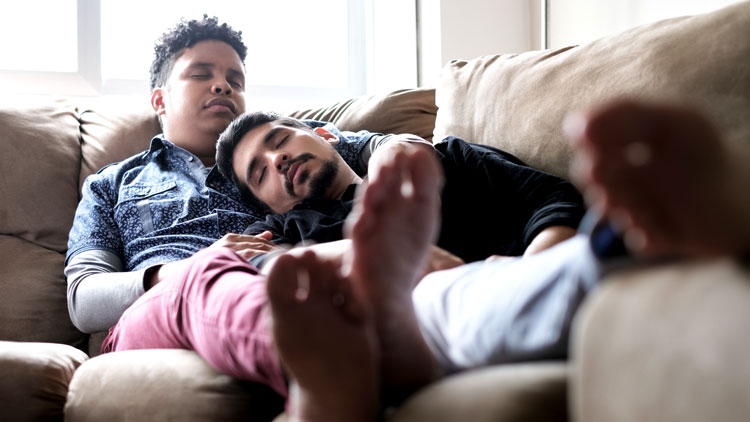Sleep is just as important to your health as diet or exercise, but with our increasingly busy lifestyles it’s often the most neglected out of the three. And yet, sleep can have both immediate and long-term negative effects on your mental health, susceptibility to illness and disease, and brain function.
The good news is that you can exert some control over the quality of your sleep. With average sleep quality declining, investing some extra effort into cultivating healthy sleep habits will help you get ahead and achieve stronger well-being in both your mind and body. These 9 tips are here to get you started on the right track:
Follow a consistent schedule
Your circadian rhythm — also known as your internal clock — tracks your sleep-wake cycle. It indicates to your body and brain when it’s time to sleep using a hormone called melatonin and alternatively, helps you to stay awake during the day. You can “set” your internal clock by maintaining consistent sleep habits. When your lifestyle and your circadian rhythm are in sync, you’ll have fewer sleepy days and fewer nights spent wide awake not able to fall asleep.
To set your clock, aim to go to bed and wake up at the same time each day. This will be especially difficult on your days off work, when you’ll probably want to go to bed late and sleep in. Fight this urge, and try to get as close to your regular sleep and wake times as possible. Eventually, you may find you don’t even need an alarm as your internal clock is so in tune to your schedule!
Embrace daytime light
Natural sunlight improves the health of your internal clock in two ways: its presence lets your clock know when it’s time to be awake and energized, and in turn its lack of presence triggers your clock to release the sleep hormone melatonin to prepare you for sleep. If you’ve been exposed to natural light during the day, research shows you’ll fall asleep faster and have higher quality sleep.
So what should you do? When first waking up in the morning, let the light in: open your blinds or curtains to experience the natural sunlight. During the work-day, take breaks outside so you can take full advantage of the sunshine.
Of course, not all of us have the benefit of sunny skies every day, all year-round. If your weather isn’t ideal, invest in an artificial light that mimics natural light. Or, for a less expensive option, try searching on your phone’s app store for one of several natural light apps that can help you wake up to a “sunrise”, and experience better lighting throughout the day. In any case, make sure you’re working in a well-lit area throughout the day.
Eat and exercise early
Your diet is critical to helping you achieve peaceful sleep. What you eat during the day — yes even your breakfast — can contribute to your sleep quality. Sugary foods and refined carbohydrates such as white bread and pasta have been linked to increased wakefulness at night. Start your day and end your day with foods that will promote healthy sleep, not prevent it.
Be sure to finish eating at least three hours before bed, as food and the process of digestion can negatively impact the release of your sleep hormone, melatonin. Plus, as an added bonus, eating earlier can help with weight loss!
As with food, you should aim to exercise earlier in the day as well, at least three hours before bedtime. Exercise increases stimulatory hormones like adrenaline and cortisol, which don’t help you down the path toward peaceful dreaming. But do make time for exercise: activity is shown to improve insomnia and help with sleep quality.
Drink the right liquids
You probably already know not to drink caffeine close to the time you sleep, but did you know you shouldn’t drink caffeine at least six hours before bedtime? It’s true: caffeine stimulates your nervous system and can stay in your blood for as long as six to eight hours, affecting your sleep well after you’ve had your last sip (or bite — caffeine is found in chocolate too).
Alcohol will also affect your sleep significantly and has been tied to symptoms of sleep apnea and a disruption in melatonin (the sleep hormone) production. While alcohol can help with falling asleep faster, its benefits usually stop there. After a few hours of sleep, alcohol will act as a stimulant, leading to poorer quality sleep overall and more wakefulness during the night. If you do drink alcohol, do so at least three hours before bedtime.
So, what can you drink? Herbal teas, such as chamomile and peppermint, have no caffeine and have a relaxing effect. Have a cup of tea in the evening, at least an hour before bed time, to help you achieve a more peaceful mindset for sleeping. Make sure to avoid drinking any liquids an hour before bed though — otherwise you may find yourself needing a bathroom in the middle of the night.
Nap smartly
Naps can be a great way for maintaining energy throughout the day when done right. If your naps are irregular or long, they could instead end up confusing your internal clock into thinking it’s nighttime. If you do want to nap during the day, experts recommend following these guidelines:
- Never nap within 5 hours of bedtime, and
- Keep naps to under 30 minutes.
In doing so, you’re less likely to confuse your circadian rhythm and negatively affect your ability to fall asleep later. If it’s a work day, try taking your nap in the early afternoon to recharge you for the last few hours of your day. If you already take regular naps that don’t follow these rules and your sleep isn’t affected, no need to change your habits.
Create a sleep-inducing environment
Many environmental factors in your bedroom contribute directly to your sleep quality. Experiment with different types and levels of temperature, noise, light, and furniture to create the ideal sleep environment for yourself. Here are a few ideas to get you started:
- Temperature: Studies show that people tend to prefer cooler, well-ventilated sleeping environments with temperatures at approximately 70° F or 20° C.
- Noise: You can create a quiet space by using ear plugs to block out external noises. You can also use a white noise machine, or download an app on your phone that produces white noise or nature sounds if that’s more your preference.
- Lights: Minimize lights from devices by placing them out of the way or using dimmer stickers. If needed, install blackout curtains on your windows or use an eye mask to fully block out light.
- Furniture: Make sure your mattress, bedding, and pillows are comfortable and supportive to prevent neck and back pain. Remember, most mattresses need to be replaced within seven to ten years (and five to eight years for bedding).
By playing around with these four elements, you can create a bedroom environment that promotes better sleep and enables you to stay asleep longer.
Develop a perfect pre-sleep routine
Whether you’ve never had a consistent pre-sleep routine, or haven’t found one that works for you yet, here are several recommendations for setting yourself up for sleep success. Within an hour or two of sleeping, you should start winding down for the day and preparing for bed by:
- Dimming the lights and turning off the TV. Nighttime light exposure will impact your internal clock, leading your body to thinking it’s still daytime. Blue light exposure in particular will keep you alert long after your desired sleep time. Put away all blue light-emitting devices, such as your phone or laptop. (Note that if you must use your devices, only use them with blue light blocking equipment, such as glasses or screen protectors.)
- Completing a calming activity, such as reading a book, listening to music, taking a bath, meditating, or breathing exercises.
- Preventing yourself from stressing about any problems, which will only make you more alert, by writing them down and setting them aside.
Boost with natural supplements
If you’re interested, you can try natural supplements to enhance your sleep and help you fall asleep faster. One of the most common methods out there is lavender oil, which has been proven to help with increasing quality of sleep. Spray a small amount on your pillow each night to receive the benefits, or use an oil diffuser near your bed to release the scent.
Other supplements that studies show can help with inducing sleep include magnesium and L-theanine, which are taken orally. Be sure to research the correct dosage and usage of these or other supplements before taking them.
Perhaps the most popular sleep helper, though, is melatonin. Melatonin is a sleep hormone that your body naturally produces to help you fall asleep and stay asleep. On nights where you expect to have trouble falling asleep — let’s say you have a lot on your mind, or were up late working on a project — try taking a melatonin supplement about 30 minutes before your bedtime.
Melatonin is proven safe in the short-term; as research is still being done on long-term, daily use of melatonin, we recommend taking it occasionally only, on nights when you especially need a boost.
Track your sleep
If you aren’t sure what quality of sleep you’re getting, track it! Yes, there are plenty of wearable devices on the market that can help you in this goal, but if you’d like a cheaper option, look no further than your phone. There are many sleep tracking apps that will monitor your movements throughout sleep, tracking when you’re most restless and most likely to be engaged in REM sleep (the deepest level of sleep). These apps provide graphs and statistics over time on how long you were actually asleep, how many hours of sleep were of high quality, and other relevant averages.
Use these to your advantage — on nights when you track as having a higher quality sleep, think about what your day and night routine were like. Could you repeat those actions again for continued success? On days your sleep suffers, try to avoid anything in the future that may have triggered you during that day. If you’re not an app person, keep a daily written record of how well-rested you feel each day so you can still engage in this experimental exercise.
If your sleep quality doesn’t improve with these tips and you suspect you have a sleep disorder such as apnea or restless leg syndrome, be sure to consult with your physician.
—
Interested in exploring flexible, work-from-home jobs? Appen is hiring!



